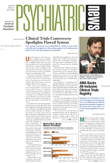Liability reform remains the number-one legislative priority of the American Medical Association. And reformulating the way physicians are paid under the Medicare program is running just behind.
In his opening address at the 2004 annual meeting of the AMA House of Delegates last month in Chicago, AMA President Donald Palmisano, M.D., reiterated the organization's central message on liability reform: rising malpractice premiums threaten access to care by driving physicians from medical practice.
He took aim again at the trial lawyers association and at apologists for the insurance industry who claim that stock-market losses in the 1990s are behind the rapid increase in premiums today.
“We have debunked the myth that insurance companies' stock-market losses are fueling skyrocketing medical liability premiums,” he said.“ No, what is driving this crisis are the out-of-sight awards some runaway juries are handing out in certain liability cases. Today the average jury award nationwide is $6.2 million, up from $3.9 million in 2001.”
Palmisano said that in Mississippi, more than $33 million was awarded in just four medical liability verdicts. And in Pennsylvania, juries returned $15 million and $20 million verdicts on the same day, he said.
“Any wonder that our AMA master file from 1997 to 2002 confirms that more than 400 Pennsylvania physicians in just four specialties are no longer practicing medicine in the state?” he asked. “Those doctors are neurosurgeons, orthopedists, obstetricians, and general surgeons. You can't replace those talented individuals from a shelf at the supermarket.”
Palmisano called for a sea change in the way medical errors are detected and fixed, replacing a punitive approach that focuses on individual mistakes with a “system quality control” approach that views errors as the result of remediable flaws within an organized system.
As a model, he cited the aviation industry, which uses just such an approach in the prevention of airline crashes.
“To stop errors, we need to prevent them through improved systems of safety,” Palmisano said. “We need to know how errors occur within a given system and find solutions based on the evidence. Now the fear of lawsuits deters health care professionals from reporting problems and hinders the efforts to determine how to keep them from happening again.
“We need to put a reporting system in place where physicians and other health professionals can report errors without fear of litigation.”
Palmisano also cited the AMA's proposal for health care reform (see
page 18), which appears as a special communication in the May
Journal of the American Medical Association.Running somewhere behind liability reform on the AMA's legislative radar screen is reformulation of Medicare's physician payment formula. Palmisano hailed the passage late last year of the Medicare Modernization Act, which the AMA had backed, but he called again for junking the current physician reimbursement formula.
Despite the 1.5 percent across-the-board increase in physician payments for 2004 and 2005 contained in the Medicare reform bill, Palmisano said payment cuts were likely again in the future.
“As long as we labor under a flawed Medicare formula that sends us lurching from one payment crisis to the next, we will not rest,” he said. “We face new cuts totaling 35 to 40 percent from 2006 to 2013. Temporary fixes aren't good enough. We need a permanent solution as soon as possible.” ▪
